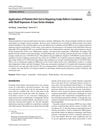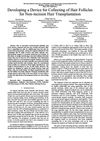 January 2024 in “Forte Journal”
January 2024 in “Forte Journal” The hair oil with lemongrass and coconut oil promotes hair growth effectively.
 January 2024 in “American journal of clinical dermatology”
January 2024 in “American journal of clinical dermatology” Ritlecitinib is safe and well-tolerated for treating alopecia areata in patients aged 12 and older.
 December 2023 in “Biological & pharmaceutical bulletin”
December 2023 in “Biological & pharmaceutical bulletin” IPM enhances skin penetration of hydrophilic drugs.
 November 2023 in “Indian journal of surgery”
November 2023 in “Indian journal of surgery” Platelet-rich gel is an effective treatment for healing scalp wounds with exposed skull.

Kalya Research is an AI tool that effectively finds and analyzes alternative medicine literature, saving researchers time.
 November 2023 in “Frontiers in veterinary science”
November 2023 in “Frontiers in veterinary science” The study provides insights into hair growth mechanisms in yaks.
 September 2023 in “Stem cell reviews and reports”
September 2023 in “Stem cell reviews and reports” Scientists found a new, less invasive way to get stem cells from horse hair for veterinary medicine.
 July 2023 in “bioRxiv (Cold Spring Harbor Laboratory)”
July 2023 in “bioRxiv (Cold Spring Harbor Laboratory)” Chitosan slows root hair growth and causes a buildup of callose at low concentrations, but at high concentrations, it only inhibits growth without callose buildup.
 February 2023 in “Asian journal of pharmaceutical research and development”
February 2023 in “Asian journal of pharmaceutical research and development” Flavonoids in Iraqi marshland plants have potential health benefits like antioxidant and anti-inflammatory effects.

Vitamin D is crucial for skin health and managing skin diseases.
 December 2021 in “Molecular genetics and genomics”
December 2021 in “Molecular genetics and genomics” Cats with abnormal hair had DSG4 gene changes causing hair problems.

Wild African goats have genetic adaptations for surviving harsh desert conditions.
 March 2020 in “Central European Journal of Biology”
March 2020 in “Central European Journal of Biology” The study found that stem cells and neutrophils are important for regenerating hair follicle structures in mice.
 November 2019 in “Harper's Textbook of Pediatric Dermatology”
November 2019 in “Harper's Textbook of Pediatric Dermatology” Understanding normal hair growth and loss in children is key to diagnosing and treating hair disorders.

Accurate diagnosis and tailored treatments are crucial for managing hair loss in humans and animals.
 October 2018 in “InTech eBooks”
October 2018 in “InTech eBooks” The most effective treatments for hair loss are minoxidil, finasteride, PRP, and hair transplants, with steroids and immunosuppressants for autoimmune types.

Researchers developed a new device that improves non-incision hair transplant efficiency.

 November 2017 in “Elsevier eBooks”
November 2017 in “Elsevier eBooks” PCOS is a genetic disorder affecting women's reproductive health, with treatments focused on symptoms like insulin resistance and fertility.
 August 2017 in “Indian journal of history of science”
August 2017 in “Indian journal of history of science” The manuscript "Strīvilāsa" offers ancient Ayurvedic knowledge on women's health, beauty treatments, and reproductive care.
 May 2017 in “InTech eBooks”
May 2017 in “InTech eBooks” Some hair loss disorders cause permanent loss due to scarring, and treatments like steroids don't always work well.
 January 2017 in “Springer eBooks”
January 2017 in “Springer eBooks” The document explains various skin conditions and their treatments.
 August 2016 in “Journal of evolution of medical and dental sciences”
August 2016 in “Journal of evolution of medical and dental sciences” Most acne patients were young males with face acne, with many experiencing worsening in summer and diet-related aggravation.
 October 2015 in “Elsevier eBooks”
October 2015 in “Elsevier eBooks” Spironolactone can cause side effects like high potassium levels and breast enlargement, and patients need careful monitoring.
 August 2015 in “Postgraduate obstetrics & gynecology”
August 2015 in “Postgraduate obstetrics & gynecology” Women with PCOS often have metabolic issues like insulin resistance and a higher risk of diabetes and abnormal lipid levels.
 August 2015 in “Postgraduate obstetrics & gynecology”
August 2015 in “Postgraduate obstetrics & gynecology” Women with PCOS often have insulin resistance, abnormal lipid levels, and a higher risk of diabetes and heart disease; lifestyle changes and medication like metformin can help manage these risks.
 July 2015 in “Cambridge University Press eBooks”
July 2015 in “Cambridge University Press eBooks” The document concludes that treatments for female hair loss and excess body hair are available, but managing expectations is important.

No treatment alters the natural progression of alopecia areata, and effectiveness varies, with some possibly working better in children.
 July 2013 in “British Journal of Dermatology”
July 2013 in “British Journal of Dermatology” The document reviews key historical figures and discoveries in dermatology.
 November 2012 in “Econometric Theory”
November 2012 in “Econometric Theory” Herman Bierens had a successful career in econometrics, contributed to education, and plans to continue research after retirement.






























